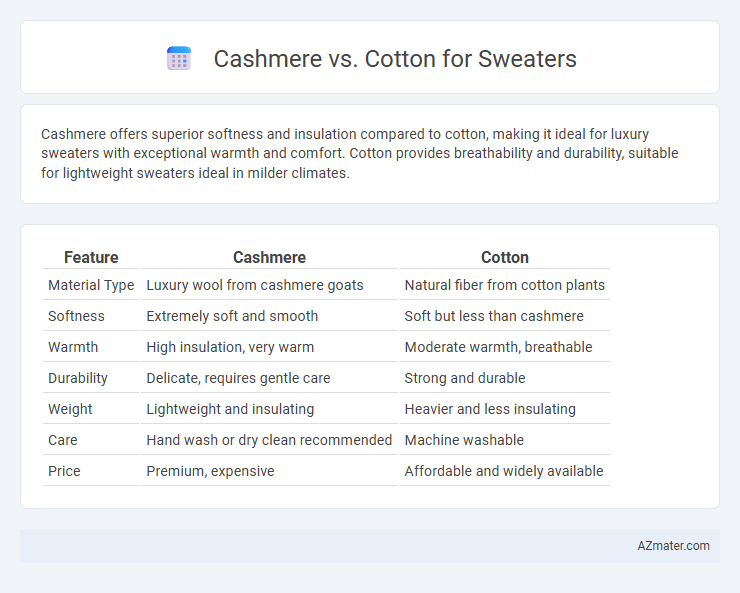Cashmere offers superior softness and insulation compared to cotton, making it ideal for luxury sweaters with exceptional warmth and comfort. Cotton provides breathability and durability, suitable for lightweight sweaters ideal in milder climates.
Table of Comparison
| Feature | Cashmere | Cotton |
|---|---|---|
| Material Type | Luxury wool from cashmere goats | Natural fiber from cotton plants |
| Softness | Extremely soft and smooth | Soft but less than cashmere |
| Warmth | High insulation, very warm | Moderate warmth, breathable |
| Durability | Delicate, requires gentle care | Strong and durable |
| Weight | Lightweight and insulating | Heavier and less insulating |
| Care | Hand wash or dry clean recommended | Machine washable |
| Price | Premium, expensive | Affordable and widely available |
Introduction to Cashmere and Cotton Sweaters
Cashmere sweaters, made from the soft undercoat of cashmere goats, offer superior warmth, lightweight comfort, and luxurious softness compared to cotton sweaters, which are woven from natural cotton fibers known for breathability and durability. Cotton sweaters provide excellent moisture absorption and are typically more affordable and easier to care for, making them ideal for casual, everyday wear. Cashmere is prized for its insulating properties and exquisite texture, making it a premium choice for cold weather and refined fashion.
Material Origins: Cashmere vs Cotton
Cashmere is derived from the fine undercoat of cashmere goats primarily found in Mongolia, China, and Iran, offering exceptional softness and insulation. Cotton originates from the fluffy fibers surrounding cotton seeds, cultivated extensively in regions like the United States, India, and Egypt, known for breathability and durability. The natural fiber sources define distinct textures, warmth levels, and care requirements for cashmere versus cotton sweaters.
Texture and Feel: Luxurious Softness or Classic Comfort?
Cashmere offers unparalleled softness and a lightweight, silky texture that feels luxurious against the skin, making it ideal for those seeking warmth with elegance. Cotton sweaters provide a breathable, smooth surface with a crisp, classic feel that suits casual comfort and durability. Both materials excel in texture, but cashmere stands out for its plush softness, while cotton emphasizes practical comfort.
Warmth and Insulation Properties
Cashmere fibers are finer and have superior insulation properties compared to cotton, trapping heat more effectively and providing greater warmth in sweaters. Cotton lacks the natural crimp and hollow core found in cashmere, resulting in lower thermal retention and breathability that is better suited for mild temperatures. For cold weather, cashmere sweaters offer enhanced softness and heat retention, making them a premium choice for insulation.
Durability and Longevity Comparison
Cashmere sweaters, made from fine undercoat fibers of cashmere goats, offer exceptional softness but are less durable than cotton due to their delicate nature and susceptibility to pilling and wear over time. Cotton sweaters provide greater longevity and durability, as their fibers are stronger and withstand frequent washing and daily use without significant damage. Choosing cashmere offers luxury and warmth with careful maintenance, whereas cotton delivers a more resilient, long-lasting option for everyday wear.
Breathability and Moisture Management
Cashmere offers superior breathability due to its fine fibers that create a natural airflow, making it comfortable for varying temperatures. Cotton excels in moisture management as it readily absorbs and releases sweat, keeping skin dry during physical activity. Combining these materials in sweaters enhances both breathability and moisture-wicking properties for optimal comfort.
Care and Maintenance Requirements
Cashmere sweaters require gentle hand washing with cold water and specialized detergent to maintain softness and prevent damage, while cotton sweaters are more durable and can typically be machine washed on a gentle cycle. Proper storage in breathable garment bags helps prevent moth damage to cashmere, whereas cotton is less susceptible and can be stored more casually. Frequent airing and avoiding direct sunlight preserve the natural fibers of both materials, extending the lifespan of cashmere and cotton sweaters alike.
Environmental Impact and Sustainability
Cashmere production generates significant environmental challenges due to overgrazing by goats, leading to soil erosion and desertification, whereas cotton farming often involves high water consumption and pesticide use that harms ecosystems. Sustainable cashmere initiatives focus on regenerative grazing and animal welfare to mitigate environmental damage, while organic cotton farming reduces chemical inputs and water usage. Choosing sweaters made from responsibly sourced cashmere or certified organic cotton supports eco-friendly practices and promotes long-term sustainability.
Price Differences and Value for Money
Cashmere sweaters typically command higher prices due to the luxurious softness, warmth, and rarity of cashmere fibers sourced from undercoat of the cashmere goat. Cotton sweaters are more affordable, offering durability and breathability but lack the insulating properties and premium feel of cashmere. In terms of value for money, cashmere provides long-lasting comfort and elegance worth the investment for cooler climates, while cotton suits budget-conscious buyers needing versatile, everyday wear.
Choosing the Right Sweater: Cashmere or Cotton?
Cashmere sweaters offer exceptional warmth and softness due to their fine fibers, making them ideal for cold climates and luxury wardrobes. Cotton sweaters provide breathability and durability, suitable for mild weather and everyday wear. When choosing the right sweater, consider cashmere for insulation and comfort, while cotton excels in versatility and ease of care.

Infographic: Cashmere vs Cotton for Sweater
 azmater.com
azmater.com